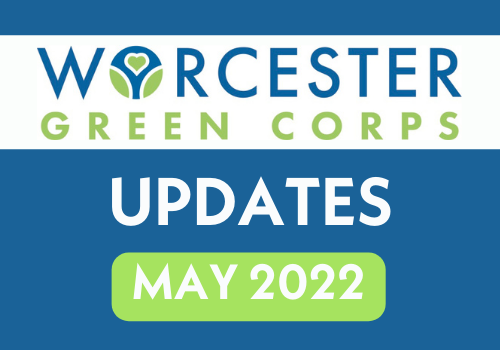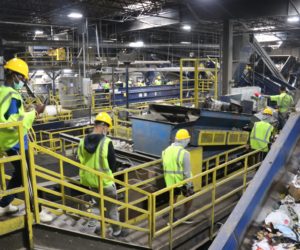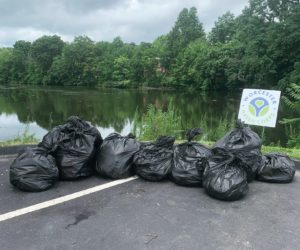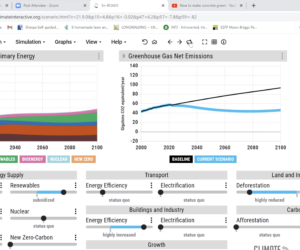Like many other places across the country, waste and materials management in the Commonwealth has changed dramatically over the last decade. Changes in the global recycling market have led to limited recycling capacity, depressed prices, and increased recycling costs. Solid waste disposal capacity throughout the Northeast has continued to decrease as more landfills close and are not replaced. Coupled with this is the fact that the COVID-19 pandemic has increased household waste across the globe. The pandemic led many households and businesses to consume single-use items at a much higher rate, resulting in a dramatic increase to the overall waste volume and adding more strain to an already stressed management system. As the options for waste management become more limited, the cost of solid waste management will continue to rise, and we will have difficulty shipping trash for disposal in other states.
Every 10 years, the Massachusetts Department of Environmental Protection (MassDEP) closely analyzes the contents of our waste stream and capacity for materials management. They particularly look at the top materials found in the trash, as well as the options to divert these materials to other means of disposal. As a result of this extensive research, the MassDEP develops the Solid Waste Master Plan (SWMP), which establishes the Commonwealth’s policy framework to address solid waste issues among Massachusetts residents and businesses. The 2030 Solid Waste Master Plan (2030 Plan), published in October of 2021, proposes a broad vision and strategies for how our community will manage waste over the next decade and beyond.
In February 2019, MassDEP published the Massachusetts Materials Management Capacity Study, which showed a decrease in management capacity for landfills, combustion, and materials recovery facilities (MRFs). The study found that landfill capacity for municipal solid waste and construction and demolition debris (C&D) is projected to decline to virtually zero by the end of 2030. While Massachusetts does have an extensive capacity for waste transfer, this doesn’t mean much when there is nowhere with the capacity to take in the solid waste. However, the study also found that there is a larger capacity across the Commonwealth to handle food materials in the waste stream. The state has several thousand tons of available capacity between anaerobic digestion and composting.
Over the most recent decade, Massachusetts has also built a comprehensive grant and assistance program for municipalities and businesses to address source reduction and increase management capacity. Programs such as the Recycling Business Development Grant and the Recycling Loan Fund have been successful in driving recycling market growth in the Commonwealth and increasing investments in recycling businesses. Since 2010, MassDEP has provided $40 million in grants, loans, and assistance to support recycling. MassDEP has also devoted significant effort to reducing the rate of contamination in recycling bins by developing the Recycling IQ Kit and the Recycle Smart initiative.
Moving forward, the MassDEP hopes that the Commonwealth will see a 30% waste reduction by 2030, and a 90% reduction by 2050. In order to achieve these ambitious goals, the 2030 Plan outlines detailed and specific action items that will help ensure adequate capacity to manage waste, as well as steps to take for source reduction. The 2030 Plan establishes subcommittees and workgroups, requires a midway program review, increases emphasis on the need to reduce and reuse, works to build local markets for our recyclables, and provides more engagement with and support for Environmental Justice Communities. In addition to the overall source reduction, the MassDEP hopes that the 2030 Plan will reduce the toxicity of municipal solid waste streams by improving the availability of household hazardous waste collection programs and implementing producer responsibility approaches for targeted materials. By 2050, MassDEP strives to reduce and begin to phase out the use of hazardous products.
Much like our vision at the Worcester Green Corps, MassDEP recognizes that to reach a zero-waste future our society must make systemic changes in how we produce, distribute, sell, and use products and services. This is going to require Massachusetts to move towards policies that encourage and require any reusable, recyclable, or compostable material to be diverted from disposal at a very high rate. Additionally, policies and actions will need to be aimed at source reduction, eliminating the use of products or packaging which are not reusable, recyclable, or compostable. It is also essential for Massachusetts residents and business owners to recognize the power in their consumption powers. If we as a society eliminate single-use items from our lifestyle, the market will naturally respond, resulting in the decreased production and sale of these products. A zero-waste future is possible, but it will require significant cultural and societal change.
ABOUT WORCESTER GREEN CORPS
The Worcester Green Corps (WGC) is a partnership program of the Worcester Regional Chamber of Commerce, the City of Worcester, Worcester Community Action Council, and the United Way of Central Massachusetts, established in May of 2021. As Worcester experiences new levels of economic development and investment, it’s in everyone’s best interests to ensure the city is clean and inviting to residents and visitors alike. WGC is a collaborative effort to keep Worcester’s streets and green spaces clean and beautiful on a year-round basis. WGC partners aim to augment existing cleanup efforts by leveraging the involvement of the business and nonprofit communities to assist in implementing beautification and environmental best practices throughout the city.
In addition to these year-round efforts, WGC works with the Worcester Community Action Council (WCAC) and FreshStart508 to provide opportunities for leadership and employment to youth and systemically disadvantaged groups. WCAC’s YouthWorks program occurs in three sessions: a six-week program in the summer, a 12-week program in the fall, and a 12-week program in the spring. The youth workers have the opportunity to learn about career readiness, green initiatives, and environmental careers, as well as to gain experience in leadership, community organizing, and program planning. FreshStart508 supplements the youth’s efforts to beautify the city with their “So Fresh and So Clean” team. Through these collaborations, WGC, WCAC, and FreshStart508 are able to offer outreach and educational tools for employability, environmentalism, and mental health services to the community.
Worcester Green Corps is an official chapter of Keep Massachusetts Beautiful.
To learn more, get involved, sponsor, or donate, please visit the WGC website.
Miranda Hotham is the Worcester Green Corps Coordinator. She can be reached by email here.
This story was originally published in the May 2022 edition of Chamber Exchange: The Newspaper, a quarterly publication of the Chamber. All newspaper editions are archived here.






